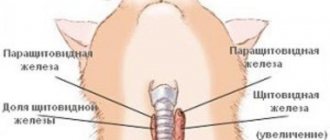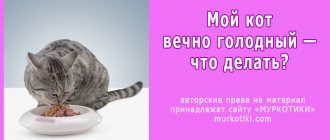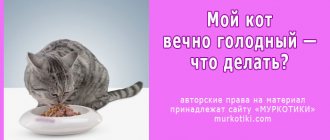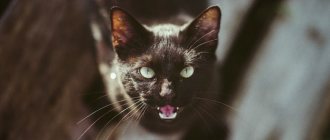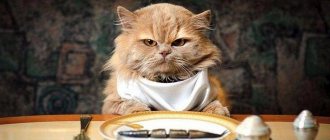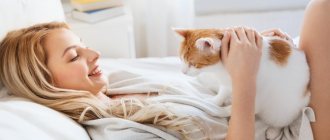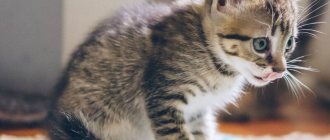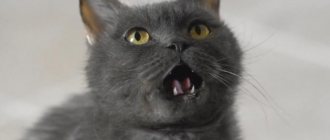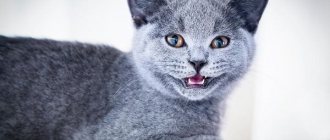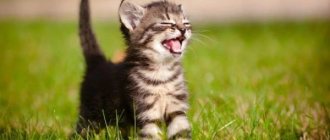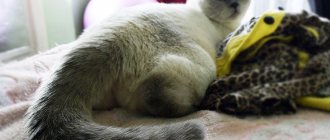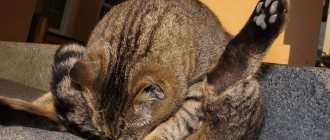Reasons why a cat doesn't eat well
In fact, you shouldn't always panic when your cat doesn't eat anything for a couple of days. Especially in cases where the animal does not look exhausted, does not have a fever, and there are no signs of an upset stomach or other malfunction of the body. The most common reasons why a cat doesn’t eat anything:
- Abrupt transition to new or unusual food.
Cats have their own taste preferences, just like people, so even high-quality food suddenly introduced into the diet can cause food refusal. The owner should always carefully study the composition of the food, the manufacturer’s recommendations for feeding, and remember that the new product is introduced gradually, only being mixed in small quantities with the old one that is familiar to the animal.
This situation can also happen when a cat that is accustomed to industrial food is switched to natural food. It is unlikely that a cat that has eaten dry food will happily eat, for example, vegetables with meat or cottage cheese. But if it’s just a matter of changing the usual diet, then there is no need to worry, the cat is simply not yet accustomed to the innovations in its menu. The animal itself does not look sick; it does not have diarrhea, vomiting, or excessive discharge from the eyes or nose.
Stressful situations.
Cats are sensitive animals; just like people, they can be sad, worried, or afraid of something. In a stressful situation, it may be quite normal to refuse food for a couple of days, feel depressed, and apathy. In this case, it would be a good idea for the owner to first try to find out what is the cause of the animal’s suffering, eliminating it if possible. If the situation cannot be corrected (the death of someone dear to the animal, the appearance of a new pet in the house, etc.), then it will take time and participation in the cat’s life on the part of the owner. You may need to consult a veterinarian, as well as purchase sedatives for purring.
Weather.
When the temperature outside the window exceeds 30 (or even 40) degrees, even the most voracious animal can look for a patch of shade on the street or lie exhausted on the floor, forgetting about food. In such cases, you should not force feed the cat and lament why it refuses to eat. On the hottest days, it is better not to overload the animal’s body, however, clean drinking water at such times is more important than ever.
The owner does not monitor the cleanliness of the animal’s bowls.
Cats are one of the cleanest animals, so the owner should wash all cat dishes after each feeding or at least once a day. Dirty plates, bowls with dried food debris, ants crowding around, and the smell of sour food can make a cat refuse to eat. In addition, neglect of cleanliness can lead to various diseases.
Hormonal surge.
When the animal's body undergoes restructuring during puberty, during estrus and pregnancy in cats, the owner may observe a refusal of food in the pet. During the period of cat spree, animals may not eat for up to a week, especially females. The owner should not worry, since the cat’s appetite will return to normal as soon as the animal calms down, and the problem of hormonal changes will be solved by itself. It may not be superfluous to purchase vitamins depending on your doctor’s recommendations.
Helminthiasis or the presence of external parasites in a cat.
The owner should remember that the presence of worms, as well as external bloodsuckers (most often fleas) can cause many problems for the animal. All parasites multiply at enormous speed, and then with their offspring they feed on the blood of the animal and poison its body with the products of their vital activity. The cat's owner should take preventive measures to ensure that the four-legged friend's body is free of worms and fleas, and also monitor the cleanliness of the room. If the owner suspects that the cat has worms, then the following symptoms will become alarming: diarrhea, cough, vomiting. Fleas can cause the following unpleasant conditions for a cat: poor sleep, thinning fur, itching from bites.
There are many pieces of fur accumulated in the cat's stomach.
In cases where an animal actively licks itself, a large amount of hair accumulates in its stomach. This problem is especially acute when the owner does not comb out the pet’s fur. Vet pharmacies sell special products that prevent the formation of hairballs, which can be purchased by the cat owner. In addition to refusal to eat, this problem is also characterized by stool disorders and vomiting.
What should an owner do if a cat doesn’t eat well?
If the cat feels cheerful and cheerful, has normal bowel movements, and the hunger strike lasts no more than 2 days, then the owner can be calm. It would be a good idea to try to gradually introduce some new foods into the diet, depending on what your cat’s diet is. If the animal eats natural food, then it makes sense to offer it some new but healthy products. If your animal's menu included industrial food, you can purchase a new type - for cats that are picky eaters. But any food should be introduced gradually and the animal should not be forcefully fed.
A good appetite is always considered an indicator of health, so many owners begin to sound the alarm when their beloved pet eats poorly or refuses to eat at all. But refusal to eat is not always a sign of illness or behavioral disorders; sometimes it is a normal condition. You need to learn to understand why the cat does not eat in order to provide the correct help to the cat in time if necessary.
How long can a cat go without eating? What are the dangers of starvation?
These are approximate dates, taking into account that the animal drinks enough these days. Longer fasting or fasting while refusing to drink is dangerous for the life of a pet.
A kitten under 6 months of age can die within 24 hours of fasting, so if the kitten does not eat, it must be force-fed.
In addition to the risk of death, refusing to eat can cause the following health problems:
- severe weight loss;
- exacerbation of any chronic diseases;
- avitaminosis.
The main reasons why a cat refuses to eat
- Stress.
- Changing your diet.
- Thermoregulation.
- Sexual instinct.
- Pregnancy.
- Parasites.
- Oral diseases.
- Poisoning.
- Foreign body and fur in the stomach and intestines.
- Viral infection.
- Diseases of the liver, kidneys and urolithiasis.
- Postpartum period.
- Consequences of anesthesia.
Stress
Cats are exposed to stress no less, and perhaps even more than people. Moving to a new place of residence, a new bowl, rearranging the room, renovations, a business trip for the owner, or mood swings of the owner - all these are stressful situations for the animal.
Even the arrival of guests or a quarrel between family members can affect the cat’s well-being.
During stress, the cat is not active, she has an apathetic mood, she does not want to play with the owner, she eats poorly or refuses to eat at all. In such a situation, there is no need to force the animal to eat; refusing food for a couple of days is the norm.
Increased attention to the cat from family members, affectionate treatment, and new toys help in stressful situations. In severe cases, consultation with a veterinarian is necessary, who can prescribe sedatives to the animal.
But be careful: the cause of stress may be the onset of an illness.
Changing your diet
New food is stressful in itself. Cats are very picky eaters and are sensitive to any change in diet. A sudden transition from one type of food to another, or a change in the brand of dry or wet food, can lead to the animal going on a hunger strike.
The animal does not understand that the new food is of better quality and cannot appreciate the efforts of the owner. The cat is accustomed to a certain food, so it declares a “boycott” on any unfamiliar food.
Monitor the condition of the animal; if the cat looks healthy and drinks enough water, then you should not worry too much about such a “hunger strike”.
Should I restrict my pet's food?
What to do if your furry pet has an increased appetite? If the cat tries to get an additional portion of food, you need to go to the veterinarian for consultation. Based on some tests, a specialist must exclude possible diseases.
Please note that the cat must be fed exclusively with premium food.
The fact is that cheap food does not contain enough nutrients. It is for this reason that most often pets are hungry. If the animal does not have problems with excess weight, you can not limit its food intake , provided that the furry pet does not have diseases. If you still have problems with excess weight, you should plan your meal schedule and reduce the portion size. If your pet is energetic and active enough, there is no reason to worry.
What is this phenomenon?
If a cat constantly asks for food, then this change in eating behavior is called polyphagia. This is a pathological condition caused by:
- gluttony and stretching of the stomach walls;
- lack of nutrients during the active growth of a young animal;
- the body's reaction to medications;
- stress or prolonged feeling of discomfort;
- cold season;
- decreased metabolism in old age.
- I want to eat.
Polyphagia can develop at any age. If your cat has been eating a lot lately, although this was unusual for him before, the reason should be identified as soon as possible.
Attention! Stressful situations and prolonged lack of appetite subsequently provoke polyphagia in cats. After a hunger strike, they try to make up for the lack of nutrients without feeling full.
When there is no need to worry
Sometimes a pet's constant hunger can be explained by natural causes, the character and behavior of the animal. A cat or kitty may simply be very active and spend a lot of calories. This is most common in young individuals. Accordingly, such pets will constantly feel hungry.
An increase in appetite in pregnant and lactating cats is also considered quite normal.
Note! Often a cat asks for food when he wants to attract attention. In fact, it requires communication. In this case, you need to pet the pet, chat with it and play.
When is there nothing to worry about?
All of the listed symptoms of cat gluttony are removable and should not cause concern to owners unless severe exhaustion/obesity, vomiting after eating, or deterioration in the condition of the coat and teeth are observed. Polyphagia can be overcome by properly organizing the feeding of the purring cat.
During the period of active growth and development, which lasts about 2 years, kittens have a great need for nutritious, balanced food. They spend a lot of energy and try to replenish it by eating more than normal. If the kitten eats a lot, grows quickly and remains energetic and playful, then there is nothing to worry about.
Babies need a lot of energy
Peculiarities of eating behavior also depend on the breed, so owners should be aware of their cat’s daily calorie requirement, as well as how this parameter changes depending on the pet’s age.
Female felines may experience an increased appetite after the end of estrus, when they try hard to make up for the lack of calories by eating. During heat, a cat completely loses its appetite due to nervousness, but subsequently they simply eat up, absorbing food in unlimited quantities.
Attention! Older cats show more interest in food than young cats. An active, non-obese pet with a slightly increased appetite should not cause concern.
Situation 4: the cat began to eat too much after castration
“After we castrated our Marquis, he had a crazy appetite. He only thinks about food. He asks all the time. I have already improved significantly. We are afraid of obesity. Why does my cat always want to eat? Can I feed him even more or not? The cat is on a natural diet.”
You are right to be afraid of obesity, because if the cat passes on, such a fate is inevitable. On the contrary, a neutered male or female cat has a lower calorie requirement than a non-neutered one. Accordingly, there are no objective reasons for increasing the amount of food. Moreover, castrates, even without taking into account the overeating factor, are more prone to a loose body due to hormonal changes.
Nevertheless, the problem must be solved. The increased appetite of castrates is dictated by hormonal changes: now the cat’s body is guided in the feeling of satiety by whether the stomach is full or not. Therefore, the first possible solution is to add more vegetables to the meat than before, but still within the acceptable limits - 10-15% of the diet. Vegetables are practically not absorbed by the cat’s body, passing through the gastrointestinal tract in transit. However, vegetables immediately after eating give you a feeling of fullness, being a kind of ballast and taking up a lot of space. That is, during one meal, the cat consumes a larger volume of food, but the food does not become more caloric. This, by the way, is the basis of the operating principle of many foods for castrates; however, as a rule, they do not contain vegetables, but a lot of grains, which is cheaper but harmful. Therefore, it is better to prepare a natural menu.
In addition, you can use the trick described above, when the pieces of meat are served in large form, so that they take longer to bite off and take longer to digest. And finally, you can divide the daily portion of food into 3 meals without increasing its volume.
In general, I would like to once again draw your attention to the fact that constant begging is not a reason to open the refrigerator. Obesity is life-threatening, and it will definitely come to an animal that moves little, sleeps a lot and eats in excess.
Article continues after advertisement
Pathological causes
There are also pathological reasons why a cat eats a lot and does not get enough, signaling serious changes in the body. This:
- impaired absorption of beneficial components due to congenital characteristics of the body or the presence of serious diseases - inflammation and intestinal cancer, exocrine insufficiency, pancreatic tumors;
- diabetes mellitus, which often affects pets;
- pregnancy and breastfeeding;
- helminthic infestation.
If the cat's constant hunger is not associated with pregnancy and worms, it requires specialized veterinary care. The presence of serious diseases affects the appearance of the animal - the cat eats a lot, but loses weight, becomes capricious, loses interest in active games, and its fur and teeth become unattractive.
It may be worth contacting a veterinarian
As a rule, most diseases respond well to treatment and require a balanced diet using special foods. You can detect the presence of the disease yourself, simply by observing your pet: the fact that the cat is always hungry, drinks a lot and often goes to the toilet indicates diabetes.
Problems with the gastrointestinal tract are indicated by vomiting and diarrhea. Of course, only a doctor can prescribe treatment!
What to do if your cat starts eating a lot
First of all, you need to carefully observe your pet. If there are any additional symptoms that are abnormal and cause concern, you should immediately contact your veterinarian. When the specialist asks about symptoms, the owner must describe in detail the facts that alarm him.
Important! If everything is fine with the animal’s health, you can try changing the food to a more nutritious one. But there is no need to get too carried away here.
Under no circumstances should you give in to the persistent requests of your pet, who may even yell for food. It is important to accustom him to a eating routine. Sometimes the problem is more about the owner than the animal. If the owner allows himself to be manipulated and gives food on demand, this can lead to a serious deterioration in the health of the cat.
Food should not be given on demand
Thus, every owner must be attentive to his pet, consistent in his actions and not forget that the animal’s health is in his hands. If necessary, be sure to seek help from a veterinarian.
What to do?
If the cat asks to eat more than the norm, then you can:
- change the food to a more expensive and nutritious one. Cheap economy class mixtures do not contain the vitamins, minerals, and biologically active substances necessary for normal growth and development of the animal. Their deficiency in the cat’s body provokes overeating;
- do not feed in excess of the norm, focusing on the instructions for consuming food, the age and physiological characteristics of the cat;
- organize fractional feeding at the same time - 2-3 times a day;
- eliminate unscheduled snacks that are skillfully begged for by cunning manipulative cats.
A pregnant cat must be fed with specially formulated food that contains the full range of essential nutritional components or the diet must be further enriched with vitamins and minerals. As a preventive measure and to get rid of parasites, regularly administer anthelmintic drugs.
Diabetes mellitus and intestinal diseases require diagnosis and drug treatment. You should also contact a veterinarian if, despite all efforts, the cat constantly asks for food, and its appearance leaves much to be desired.
Diabetes
In diabetes mellitus, nutrients are not absorbed in the body, which causes energy deficiency.
Particular attention should be paid to such a disease as diabetes.
The disease is characterized by the development of metabolic pathologies that provoke absolute or relative insulin deficiency. As a result of such a disease, metabolic processes of all systems are disrupted. There is a failure of carbohydrate, fat, protein, mineral and water-salt balance.
Despite the efforts of the owners and the good diet of the animal, nutrients cannot be absorbed into the body , since the lack of glucose provokes an energy deficit for this process. And glucose itself is absorbed only with insulin, which is not enough as a result of a failure of metabolic processes.
Symptoms
One of the symptoms of diabetes is constant thirst.
The main accompanying symptoms of diabetes include: obesity, increased thirst.
- With excessive appetite, the pet sharply loses weight, and the amount of urine output increases.
- Peripheral neuropathy manifests itself - the animal walks, leaning on the entire foot, the gait is uncertain, unsteady.
- The cat becomes weak, lethargic, and reluctant to make contact.
- The smell of acetone is felt from the oral cavity, the skin becomes thinner, the coat is disheveled, dull, a sickly appearance and a dull look.
Treatment
Therapeutic measures consist primarily of a properly selected low-carbohydrate diet.
A properly selected diet is the key to successful treatment of a cat.
It is recommended for pets who have recovered from this diet to remain on this diet for the rest of their lives. Sugar-lowering tablets and insulin injections are used.
If diabetes is suspected, the owner can independently check the sugar level. To do this, you will need to conduct a test using special urine strips. It is also possible to use a veterinary glucose meter to check your blood sugar levels. The physiological indicator of sugar in the urine is its absence. In the blood - from 3.3 to 6 mmol/l .
